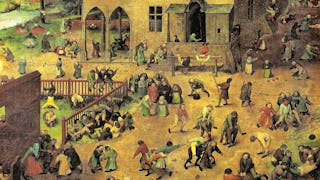This course provides a brief introduction to game theory. Our main goal is to understand the basic ideas behind the key concepts in game theory, such as equilibrium, rationality, and cooperation. The course uses very little mathematics, and it is ideal for those who are looking for a conceptual introduction to game theory.



(1,989 reviews)
What you'll learn
The reason why we need game theory to analyze social problems
Nash equilibrium as a unified solution concept and the reason why players come to play Nash equilibrium
The relationship between intellectual capacity of players and Nash equilibrium
The relationship between the rationality of individuals and socially desirable outcomes
Skills you'll gain
Details to know

Add to your LinkedIn profile
20 assignments
See how employees at top companies are mastering in-demand skills


Earn a career certificate
Add this credential to your LinkedIn profile, resume, or CV
Share it on social media and in your performance review

There are 4 modules in this course
Is it possible to analyze a wide variety of social and economic problems using a unified framework? In the first module, we address this question. We will see that the concept of rational decision making is useful, but it is not quite sufficient to provide governing principles. Motivated examples and some history of game theory will be provided. You will also be asked to play a simple card game to see how it feels to make your decisions strategically.
What's included
12 videos6 readings5 assignments
The basic solution concept of game theory is Nash equilibrium. In Module 2, we try to understand this central concept through various examples and ask the following crucial question: how do players come to play a Nash equilibrium?
What's included
10 videos1 reading5 assignments
In Module 3, we will dig deeper into the relationship between rationality and Nash equilibrium. We will consider the whole spectrum of possible intellectual capacities of players, spanning the range from unlimited ability for sophisticated reasoning to absolute zero intelligence. In the end, you will see that Nash equilibrium can emerge under a fairly wide range of intellectual capacities of players.
What's included
9 videos3 readings5 assignments
The final module is devoted to the most important and most general message of game theory: rational behavior quite often leads to a socially undesirable outcome. We will first try to understand the basic reason for this, and then see how this insight of game theory has made fundamental impacts in the natural and social sciences. Finally, we will learn some general methods to overcome this problem.
What's included
11 videos2 readings5 assignments
Instructor

Offered by
Recommended if you're interested in Economics


Stanford University


Stanford University


IIMA - IIM Ahmedabad


Georgia Institute of Technology
Why people choose Coursera for their career




Learner reviews
1,989 reviews
- 5 stars
74.81%
- 4 stars
20.46%
- 3 stars
3.06%
- 2 stars
0.85%
- 1 star
0.80%
Showing 3 of 1989
Reviewed on Aug 3, 2020
It actually took sometime to me to complete this course. However it was a great learning experience for me. I think it will help me in future to pursue my career.
Reviewed on Aug 11, 2016
This course is very interesting, it helps to understand basic knowledge in game theory) And it's also easy to understand, because of available explanations of material.
Reviewed on Aug 18, 2022
Best course in the world (yet) !!! Loved the teaching style and humour of Mr. Michihiro Kandori !! I would HIGHLY RECOMMEND you to take this course ...Thanking you,DACHAMP 633

Open new doors with Coursera Plus
Unlimited access to 10,000+ world-class courses, hands-on projects, and job-ready certificate programs - all included in your subscription
Advance your career with an online degree
Earn a degree from world-class universities - 100% online
Join over 3,400 global companies that choose Coursera for Business
Upskill your employees to excel in the digital economy
Frequently asked questions
Access to lectures and assignments depends on your type of enrollment. If you take a course in audit mode, you will be able to see most course materials for free. To access graded assignments and to earn a Certificate, you will need to purchase the Certificate experience, during or after your audit. If you don't see the audit option:
The course may not offer an audit option. You can try a Free Trial instead, or apply for Financial Aid.
The course may offer 'Full Course, No Certificate' instead. This option lets you see all course materials, submit required assessments, and get a final grade. This also means that you will not be able to purchase a Certificate experience.
When you purchase a Certificate you get access to all course materials, including graded assignments. Upon completing the course, your electronic Certificate will be added to your Accomplishments page - from there, you can print your Certificate or add it to your LinkedIn profile. If you only want to read and view the course content, you can audit the course for free.
You will be eligible for a full refund until two weeks after your payment date, or (for courses that have just launched) until two weeks after the first session of the course begins, whichever is later. You cannot receive a refund once you’ve earned a Course Certificate, even if you complete the course within the two-week refund period. See our full refund policy.
More questions
Financial aid available,


